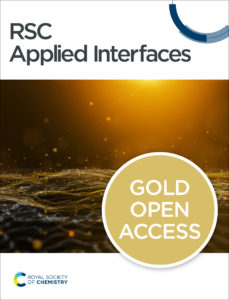
RSC Applied Interfaces has published its first few issues which can be read for free here. To celebrate our recently-published articles, we asked our authors to share some comments on their work.
In this post, we hear from Dr Yabu and their team, providing some insight into their recently published article entitled Rare-metal-free high-performance water-activated paper battery: a disposable energy source for wearable sensing devices.
Comments from the authors
“The Great East Japan Earthquake and Tsunami of 2011 caused widespread devastation, including in Sendai, where Tohoku University is located. We witnessed many people being swept away by the tsunami during the disaster. If the exact location of those caught in the tsunami or lost at sea could have been known immediately, some lives might have been saved.
We have successfully developed a metal-air paper battery that generates electricity by absorbing water, using our unique catalyst technology, which can be utilized as a power source for global positioning system (GPS). The smart life jacket, equipped with this battery and GPS, can instantly transmit location information via GPS when it gets wet, allowing for precise identification of the position of individuals in need of rescue.
Our group aims to contribute to the safety of people working at sea and to rescue efforts during disasters through the manufacturing of this smart life jackets equipped with the high-performance batteries, and the integration of sensor components such as GPS.”
Meet the authors

From left to right: Prof Yabu, Mr Ishibashi, Prof Ono, and Mr Ito discussing application of a metal-air paper battery to a smart life jacket equipped with a GPS sensor.
Want to find out more? Read the full paper below!
Kosuke Ishibashi, Shimpei Ono, Jun Kamei, Koju Ito and Hiroshi Yabu
RSC Appl. Interfaces, 2024, 1, 435-442 DOI: 10.1039/D3LF00258F
RSC Applied Interfaces is a dedicated, interdisciplinary reference journal for cutting-edge research on the applications of surfaces and interfaces. In addition to the applied focus, work considered for publication in RSC Applied Interfaces is expected to be highly original and of top quality. The journal seeks to report major scientific advances beyond the state of the art, at the cutting edge of this interdisciplinary field.



